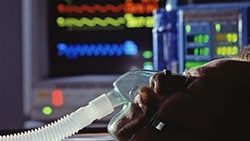Was It Really Brain Death?
Twenty-one-year-old Zack Dunlap from Oklahoma appeared on NBC's Today Show in 2008 to tell an incredible story of hearing a physician telling his parents that a PET scan confirmed that he was brain dead after a catastrophic brain injury. While he was being prepared for organ donation, however, he moved his arm purposely in response to stimuli. Dunlap recovered, went to a rehabilitation hospital, and ultimately went home 48 days later, very much alive.[1]
Earlier this year, 13-year-old Trenton McKinley from Alabama and his parents hit the media circuit to talk about the miracle of Trenton awakening after being declared brain dead from a vehicle accident—1 day before his organs were scheduled to be harvested.[2]
The likely explanation for such "recoveries" from brain death, according to experts, is that these individuals were never brain dead in the first place. "Errors have been made where people declared brain dead were later found to have spontaneous movement that should not have been possible," says Robert M. Sade, MD, professor of surgery and director of the Institute of Human Values in Health Care at the Medical University of South Carolina in Charleston. "In virtually all those cases, brain-death determination was not done correctly. If you don't go through the exact protocol for brain-death determination, you're likely to have patients diagnosed as being dead by neurologic criteria who are, in fact, not brain dead."

A more typical brain death error is the 2011 case of a 55-year-old with brain injury who was treated with hypothermia to try to optimize neurologic recovery. He was declared brain dead 24 hours after he was rewarmed—which was too short a period of time. During preparation for organ procurement, it was noticed that he had regained some brainstem reflexes—he certainly wasn't fine—and, therefore, wasn't brain dead.
When the American Academy of Neurology (AAN) updated its guidelines for determining brain death in adults in 2010, a committee of experts searched the literature and found no legitimate "reports of patients recovering brain function when the criteria for brain-death determination was used appropriately," says Ariane K. Lewis, MD, associate professor, department of neurology and neurosurgery, NYU Langone Medical Center, New York City, and a member of the AAN's Ethics, Law, and Humanities Committee.
But at the same time there is no way of knowing how many people recover from brain death because they are usually quickly removed from life support or become organ donors.
Medscape Business of Medicine © 2018 WebMD, LLC
Any views expressed above are the author's own and do not necessarily reflect the views of WebMD or Medscape.
Cite this: Anita Slomski. Another 'Brain Dead' Patient Wakes Up Just in Time - Medscape - Oct 16, 2018.








Comments